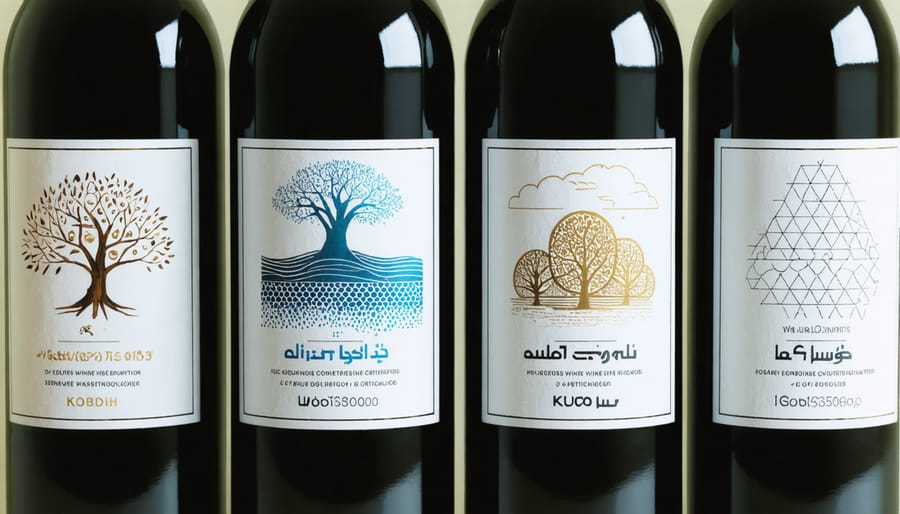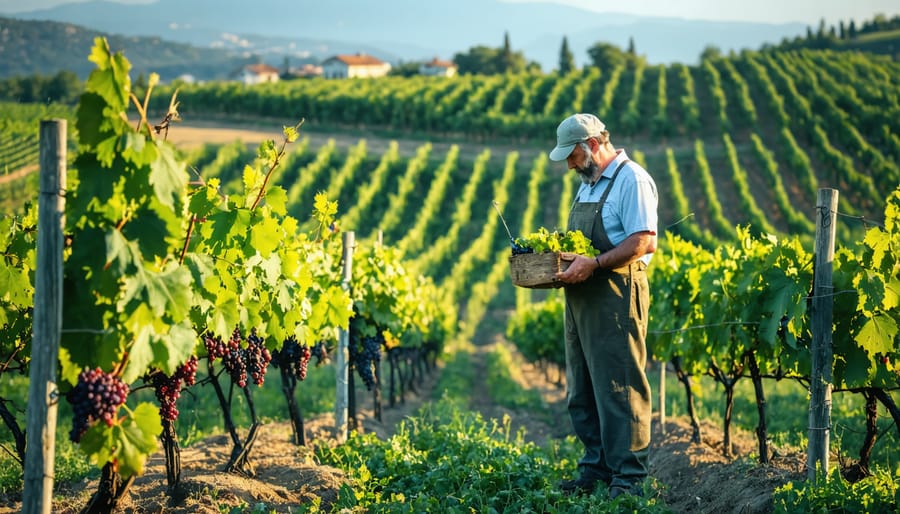
Discover the perfect harmony of tradition and sustainability in every glass of kosher organic wine. As more wine enthusiasts embrace both ethical consumption and religious observance, these specialized wines represent a growing category that honors both ancient Jewish law and modern environmental stewardship. From the sun-drenched vineyards of Israel to the rolling hills of California, winemakers are crafting exceptional kosher organic wines that prove you don’t have to compromise on taste, values, or religious requirements.
Whether you’re planning a Shabbat dinner or simply seeking a wine that aligns with both your spiritual and environmental principles, understanding kosher organic wine opens up a world of sophisticated options. These wines not only meet the strict requirements of kosher certification – including supervision by qualified rabbis and the use of kosher-certified ingredients – but also adhere to organic farming practices that exclude synthetic pesticides and fertilizers. The result is a pure, authentic expression of terroir that respects both tradition and the Earth.
Understanding Kosher Wine Certification
What Makes Wine Kosher?
Making wine kosher involves more than just a blessing – it’s a fascinating process that connects ancient traditions with modern winemaking. As someone who’s visited several kosher wineries, I can tell you that the key difference lies in who handles the wine. From the moment the grapes are crushed until the bottle is sealed, only Sabbath-observant Jewish individuals can touch the wine or the equipment used to make it.
The process must be overseen by a certified mashgiach (kosher supervisor), ensuring every step adheres to Jewish dietary laws. All ingredients, including yeasts and fining agents, must be kosher-certified. During Passover, additional restrictions apply, which is why you’ll often see “Kosher for Passover” labels on some bottles.
Interestingly, many of my wine-loving friends are surprised to learn that flash pasteurization is often used in kosher wine production. This process, called mevushal, allows the wine to remain kosher even if served by non-Jewish individuals – perfect for restaurants and catered events. While this step isn’t required for all kosher wines, it’s common in many popular brands you’ll find on shelves today.

The Role of Mashgiach in Wine Production
At the heart of kosher wine production stands the mashgiach, a qualified Jewish supervisor who ensures every step of the winemaking process adheres to kosher laws. Think of them as the guardian angels of kosher certification – they’re present from the moment the grapes arrive at the winery until the wine is sealed in bottles.
I recently had the pleasure of speaking with Sarah Cohen, a mashgiach at a California organic winery, who shared that her role goes beyond mere supervision. “We’re not just watching; we’re actively participating in the process,” she explained. “Only observant Jews can handle the wine, from crushing the grapes to operating the equipment.”
What makes this role particularly fascinating in organic wine production is the beautiful harmony between ancient Jewish laws and modern sustainable practices. The mashgiach ensures that no unauthorized additives enter the wine, which naturally aligns with organic wine standards. They verify that all equipment is properly cleaned and koshered (made fit for kosher use), and that the entire production maintains its religious integrity while meeting organic certification requirements.
For wine lovers seeking both kosher and organic certification, the mashgiach’s presence offers that essential peace of mind, guaranteeing that your wine meets both spiritual and environmental standards.
The Organic Wine Connection
Organic Certification Standards
When it comes to organic wine certification, there’s more to it than just avoiding synthetic pesticides in the vineyard. As someone who’s toured several organic wineries, I can tell you it’s a fascinating process that ensures both environmental sustainability and wine quality.
For a wine to be certified organic in the United States, vineyards must follow strict USDA guidelines for at least three years before certification. This means no synthetic fertilizers, pesticides, or herbicides can touch those precious grape vines. Instead, winemakers use natural methods like companion planting and beneficial insects to protect their crops – it’s like having a tiny ecosystem working in harmony!
The certification process also extends to the winemaking itself. Organic wines must be produced without artificial additives, and the sulfite levels are strictly regulated. While conventional wines can contain up to 350 parts per million of sulfites, organic wines are limited to just 100 parts per million.
The certification process involves detailed record-keeping, regular inspections, and ongoing compliance monitoring. It’s quite an investment for wineries, but many find it worthwhile as more of us seek out environmentally conscious options. When you see that USDA Organic seal on your kosher wine bottle, you can be confident that every step – from vine to wine – meets these rigorous standards.
Remember that organic certification requirements may vary slightly by country, but the core principles of natural farming and minimal intervention remain consistent worldwide.

Sustainable Practices in Kosher Organic Winemaking
When it comes to kosher organic winemaking, many vineyards are embracing sustainable wine practices that honor both religious traditions and Mother Earth. I recently visited a family-owned kosher vineyard where they’ve perfected the art of combining ancient Jewish law with modern eco-friendly techniques.
These forward-thinking winemakers use natural pest control methods, like introducing beneficial insects and maintaining bird-friendly habitats, instead of chemical pesticides. They’ve also mastered the art of water conservation through precision irrigation systems and drought-resistant grape varieties that thrive in their local climate.
One of my favorite discoveries was learning about their composting program, where grape pomace (the leftover skins and seeds) gets transformed into nutrient-rich soil amendments. This beautiful cycle of renewal aligns perfectly with the Jewish principle of Bal Tashchit, which teaches us not to waste resources.
Many kosher organic wineries also incorporate biodynamic farming principles, timing their vineyard activities with lunar cycles and using natural preparations to enhance soil health. These methods not only protect the environment but often result in wines with more complex flavors and a true sense of terroir.
Solar panels power many of these wineries’ operations, while rainwater harvesting systems help reduce their environmental footprint. It’s inspiring to see how these producers are proving that traditional kosher winemaking can embrace innovation while staying true to its roots.
Choosing and Serving Kosher Organic Wines
Reading Labels and Understanding Certifications
Let me help demystify those wine labels for you! When shopping for kosher organic wine, you’ll want to look for two main types of certifications. First, for kosher certification, look for symbols like the OU (Orthodox Union), OK, or Star-K on the label. These trusted marks ensure the wine meets all religious requirements from grape to glass.
For the organic side, you’ll find either “Made with Organic Grapes” or the USDA Organic seal. The USDA seal means the wine is 100% organic with no added sulfites, while “Made with Organic Grapes” indicates at least 95% organic ingredients with minimal sulfites allowed.
Here’s a helpful tip I learned while exploring wine shops: flip the bottle around! The back label often contains valuable information about the winemaking process. Look for terms like “mevushal” (if the wine has been heated) and “yayin” (which simply means wine in Hebrew).
Some producers go above and beyond with additional certifications like Demeter (biodynamic) or various eco-friendly seals. Don’t feel overwhelmed – start with the basics of kosher and organic certifications, and expand your label knowledge gradually. Remember, your local wine merchant can be an excellent resource for understanding these certifications better. When in doubt, snap a photo of the label and ask your favorite wine community for insights!
Pairing and Serving Suggestions
Let’s explore the delightful world of wine and food pairings with kosher organic wines! I’ve discovered that these wines are incredibly versatile and can elevate your dining experience when served at the right temperature and with complementary dishes.
For crisp kosher organic white wines, aim to serve them between 45-50°F (7-10°C). These wines pair beautifully with light Mediterranean dishes like grilled fish, fresh salads, and roasted vegetables. I particularly love serving them alongside quinoa-stuffed bell peppers or herb-crusted halibut.
Red kosher organic wines shine when served slightly cooler than room temperature, around 60-65°F (15-18°C). They make perfect companions for heartier dishes like braised brisket, mushroom-based vegetarian entrees, or grilled lamb. One of my favorite combinations is a full-bodied organic kosher Cabernet Sauvignon with a rich vegetable tagine.
For those special occasions, kosher organic sparkling wines should be well-chilled at 40-45°F (4-7°C). They’re wonderful as aperitifs or paired with light appetizers like fresh fruit, nuts, or mild cheeses. Pro tip: I always keep a bottle in the fridge for impromptu celebrations!
Remember to let your red wines breathe for about 30 minutes before serving to allow their full flavors and aromas to develop. This small step makes a noticeable difference in your tasting experience.
Storage and Preservation Tips
Just like your favorite organic produce, kosher organic wine needs proper care to maintain its delightful characteristics. I’ve learned through experience that proper storage can make a remarkable difference in how we preserve wine quality and enhance our enjoyment of each bottle.
Store your kosher organic wine in a cool, dark place between 45-65°F (7-18°C). Your kitchen might be convenient, but avoid placing bottles near the stove or sunny windows. A dedicated wine fridge is ideal, but a basement or interior closet works beautifully too.
Keep bottles on their side if they have natural corks to prevent them from drying out. For bottles with synthetic corks or screw caps, vertical storage is perfectly fine. Maintain consistent humidity levels around 70% to protect those precious labels and preserve the cork’s integrity.
Once opened, store your kosher organic wine in the refrigerator and try to enjoy it within 3-5 days. Pro tip: invest in a quality wine vacuum pump to remove excess air and extend freshness. Remember, organic wines often contain fewer preservatives, so they might be more sensitive to storage conditions than conventional wines.

Choosing kosher organic wine represents more than just a beverage preference – it’s a mindful decision that aligns with both traditional values and modern sustainable living. As we’ve discovered, these wines offer the perfect blend of ancient wisdom and contemporary environmental consciousness. Not only do they meet strict kosher requirements, but they also support sustainable farming practices that benefit our planet. Whether you’re hosting a holiday gathering or simply enjoying a quiet evening at home, kosher organic wines provide peace of mind knowing you’re making a choice that respects both tradition and the environment. With more varieties becoming available and quality continuing to improve, there’s never been a better time to explore these exceptional wines. By choosing kosher organic wines, we’re not just maintaining religious traditions – we’re participating in a broader movement toward mindful consumption and environmental stewardship that future generations will surely appreciate.



